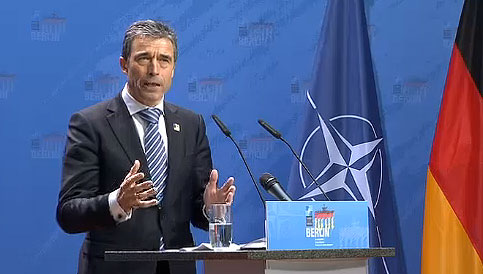Press conference by NATO Secretary General Anders Fogh Rasmussen
on the second day of the meeting of NATO Foreign Affairs Ministers, Berlin

Good afternoon,
We have just completed two busy days of meetings with partners. Yesterday, our focus was on the way ahead in Libya and transition in Afghanistan. Today we have taken forward our political and practical cooperation with Georgia, Ukraine and Russia.
Afghanistan remains NATO’s most important mission. ISAF Foreign Ministers discussed yesterday our Enduring Partnership with Afghanistan. This is the framework on which NATO is building its long-term engagement with Afghanistan, which will last beyond the date when our combat role ends. At our meeting, NATO and Afghanistan began to chart the path of how to take this Partnership forward.
Partnerships are a vital part of NATO’s work. This morning we approved a new set of rules to improve the way we do business with those nations that share our interest in contributing to international security. Our partnership menu is already extensive, but from now it will be richer as we intend to expand the scope of our cooperation.
The “Berlin partnership package” approved today will allow us to work on more issues, with more partners, in more ways. That is a win-win for all of us.
We also held a fruitful meeting with our colleague from Georgia. We reaffirmed our support for the sovereignty and territorial integrity of Georgia. We thanked Georgia for its substantial contribution to our operation in Afghanistan and welcomed its strong performance in defence reform. This year will be key for putting forward more democratic reforms, and we look forward to progress on that front.
We also met with the Ukrainian Foreign Minister. Ukraine is a valued partner which contributes widely to our operations. The presence of Minister Gryschenko at our meeting with Libya partners yesterday confirmed this policy of engagement. We also discussed key issues of our distinctive partnership, including cooperation on emerging security challenges.
And we concluded today with a meeting of the NATO-Russia Council – I am happy to report that the NATO-Russia Council is in good shape. This was a ministerial session with a solid agenda, where we devoted much time to discussing current issues, especially Libya.
Such consultations are exactly what the NATO-Russia Council is about – a transparent dialogue with no taboos. In this spirit, we are also delivering on the agenda we set at last year’s Lisbon summit.
The 29 foreign ministers declared the NATO-Russia Council Helicopter Maintenance Trust Fund for Afghanistan operational, with Germany as the lead nation. This is good news for the NATO-Russia Council – we are tackling together the challenge of stabilizing Afghanistan. But most importantly, this is good news for Afghanistan. Its forces will benefit from this valuable equipment to improve the security of Afghan citizens.
We also adopted a new NATO-Russia Action Plan on Terrorism – to deal with a common challenge that concerns all our citizens.
And we have addressed prospects for missile defence cooperation. This important exchange will continue with vigor in the coming months.
And now I am happy to take your questions.
